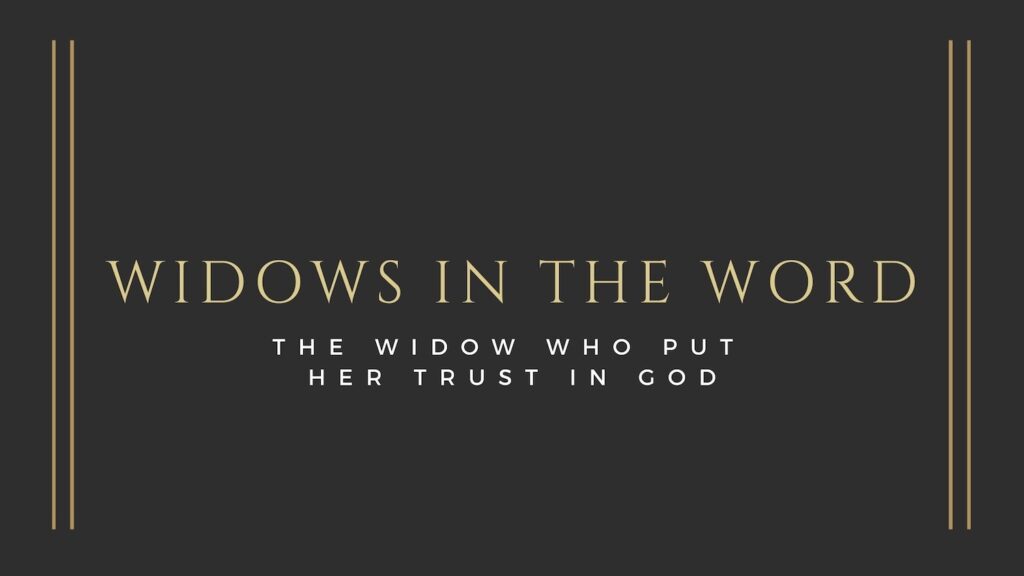Trust, a simple action word, “reliance on the integrity, strength, ability, surety, of a person or thing. Confident expectation of something; hope,” but often difficult to do.
Who we place our trust in is as crucial as the action of trusting.
Widows are encouraged and challenged to put their trust in God
“Leave your fatherless children, I will [do what is necessary to] preserve them alive; and let [those made] your widows trust and confide in Me” (Jeremiah 49:11, AMPC, emphasis added)
“The widow who is truly in need and left all alone has put her hope in God and continues night and day in her petitions and prayers” (1 Timothy 5:5, CSB, emphasis added)
Trusting God is not always easy, yet God knows this is the most important first step into the unknown season of widowhood.
Trust is an action of faith. Perhaps you remember that feeling as a small child jumping into the strong arms of an adult in the deep end of a pool. Or sitting in a chair trusting it would hold your weight. Or making a decision without knowing how the scenario would unfold.
Faith is the “assurance of things hoped for, the conviction of things not seen” (Hebrews 11:1). This is where trust comes in. We are told to put our trust in God not in what we can see or understand. We must trust God instead of our feelings. When a widow places her trust in God, she will discover that He is trustworthy.
“Trust in the LORD with all your heart and do not lean on your own understanding. In all your ways acknowledge Him, and He will make your paths straight” (Proverbs 3:5-6, NASB).
Walking across Niagara Falls on a tightrope
History shares a story of a man, Charles Blondin, skilled in walking across Niagara Falls on a tightrope. Crowds gathered and cheered as he increased the feat by crossing over in a bag, on a bicycle, and even walking backwards.
When he asked the spectators if they thought he could push a wheelbarrow across the waters, the applause roared affirming their confidence. Excitement grew when he posed the question, could he make it across with someone sitting in the wheelbarrow? Yes, yes, they believed he could!
Soon he asked for a volunteer to get into that wheelbarrow to ride to the other side. Hands withdrew making it obvious that there is a difference between belief and trust.
Trust is a verb requiring action.
Yes, at times it feels as if you are jumping off a cliff or riding in that wheelbarrow over Niagara Falls. Yet, for me, placing my trust in God at the beginning of widowhood was not an option.
The Bible shares stories of women who have been left alone, widowed. Each one placed her trust in God. It seems that the environment of suffering is God’s favorite place to rain His grace and display the rainbow of His great glory.
An overview of these ladies who walked by faith offer a treasury of wisdom, encouragement, challenge, and hope, reminding us that it is always good to put our trust in God.
- The widow who cried out—the persistent one—found that God delights in satisfying our deepest needs. (Luke 18:1-5)
- The young widow with a full life ahead—Anna—gave her life to prayer. As a result, she was the first to meet the Messiah. (Luke 2:36-38)
- The widow facing a crisis—Naomi—discovered that when our identity is in Christ, bitterness always finds a way to become better. (Ruth 1-4)
- The widow anticipating her own death—a widow commanded by God—must have felt she was in the middle of a mess when asked to give her last meal to Elijah. As a result, God provided food during an extended time of famine. (1 Kings 17)
- The widow in debt—fearing the fate of her sons—humbled herself and publicly asked for aid from her neighbors, then privately sought the Lord’s help. As a result, she experienced supernatural provision, in proportion to her faith. When empty best describes the situation, we know that an eternal purpose is in the heart of God. (2 Kings 4:1-7)
- The widow who gave sacrificially—was seen by God—and displayed by Jesus as an example for all to follow. (Mark 12:41-44, Luke 21:1-4)
- The widow at the cross—Mary—demonstrates God’s compassion for the widow giving instructions for her care. (John 19:26-27)
6 verses for placing your trust in God
Are you afraid? Trust in God. “When I am afraid, I will trust in You” (Psalm 56:3-4, CSB).
Do you lack peace? Trust God. “You keep him in perfect peace whose mind is stayed on you, because he trusts in you. Trust in the Lord forever, for the Lord God is an everlasting rock” (Isaiah 26:3-4, ESV).
Have you been uprooted? Trust God. “Blessed is the man who trusts in the LORD and whose trust is the LORD. For he will be like a tree planted by the water, that extends its roots by a stream and will not fear when the heat comes; but its leaves will be green, and it will not be anxious in a year of drought nor cease to yield fruit” (Jeremiah 17:7-8 NASB).
Do you feel helpless? Trust God. “The LORD is my strength and my shield; My heart trusts in Him, and I am helped” (Psalm 28:7 NASB).
Have you been betrayed and rejected? Trust God. “Trust in Him at all times, you people; pour out your hearts to Him, for God is our refuge” (Psalm 62:8, NIV).
Do you feel alone? Trust God. “And those who know Your name will put their trust in You, for You, O LORD, have not forsaken those who seek You” (Psalm 9:10, NASB).
Perhaps you feel as though you did trust God and life did not turn out as you desired. It is at these moments the songwriter shares, “When you can’t trace His hand, trust His heart.” (Eddie Carswell, Trust His Heart)
You may ask, “How do I trust God?” Start with trusting God moment by moment, circumstance by circumstance, day by day, and before long you will discover that you have learned to simply trust God.






